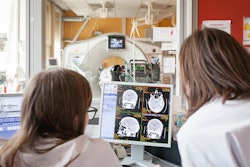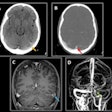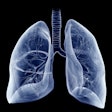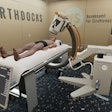An international consortium has received the green light to develop an AI "software as medical device" for creating sustainable CT images with "digital contrast" from native CT images.
The team submitted a proposal, called NetZeroAICT, for a grant from EU Horizon Europe, and it has now received official approval for a sum of 6 million euros. Funding has also come from UK Research Innovation. The project officially launched on 1 December and will run for four years (see https://netzeroaict.eu/).
Coordinated by Collective Minds Radiology and scientifically led by University of Oxford, 20 consortium members will be involved. The aim is to find a solution that will reduce the environmental impact of CT imaging and cut the global reliance on iodinated radiocontrast media, according to a press release issued on 12 December.
 Virtual contrast CTs won’t require the insertion of needles. After the first non-contrast scan, AI algorithm synthesizes contrast digitally and overlays this over the original non-contrast CT image. Courtesy of NetZeroAICT.
Virtual contrast CTs won’t require the insertion of needles. After the first non-contrast scan, AI algorithm synthesizes contrast digitally and overlays this over the original non-contrast CT image. Courtesy of NetZeroAICT.
The average carbon footprint of a CT scan is around 9 kg due to single-use consumables (needle, dressings, packaging) and additional energy consumption, and around 60% of CT scans -- 180 million per year globally -- require the injection of iodinated contrast, the release stated. Because the contrast is excreted with urine, it has an impact on environmental biodiversity.
The group plans to “develop and deploy trustworthy ‘green’ AI software,” noted Regent Lee, associate professor of vascular surgery at the University of Oxford and UK Research and Innovation Future Leaders Fellow (https://www.linkedin.com/in/regentlee/).
“European patients will have access to safer, faster, equitable and sustainable healthcare delivery while the healthcare systems strengthen their alignment with the European Green Deal,” said Lee, who is the scientific coordinator of the NetZeroAICT Consortium. “This is a new era of translational research. In addition to improving patients’ health, our aspiration is to improve planetary health for future generations.”
The first step is to build a CT image repository consisting of a million cases, or around 500 million images. This repository will contain data from more than 10 hospital groups from countries around the world, including France, Greece, Poland, Belgium, England, Scotland, Australia, and Brazil.
“The project is a great example of the possibilities of contributing to sustainability internationally and multidisciplinary,” Prof. Erik Ranschaert, PhD, who is representing the Z-Visie team of radiologists collaborating in the project, told AuntMinnieEurope.com. “I am really proud to be able to help achieve this goal by assisting in the development of AI-tools that can be applied in any institution and any country.”
 The project team gather for a launch event for NetZeroAICT.
The project team gather for a launch event for NetZeroAICT.
Z-Visie is responsible for organizing and executing the clinical validation of the five algorithms being developed, in collaboration with Unilabs Sweden, stated Ranschaert (https://www.linkedin.com/in/eranschaert/).
According to project coordinator Anders Nordell (https://www.linkedin.com/in/anders-nordell-849b1456/) from Collective Minds Radiology, "There is almost unlimited expertise and data in healthcare. The problem is that it is locked into silos. In order to advance care, more collaboration is needed. The NetZeroAICT project will break these barriers and set a new standard with the ‘cleanest’ data for AI research in CT imaging. We have developed privacy preserving technology and international legal frameworks which enables international health data sharing, highly secure and compliant with privacy regulations, such as GDPR."
A key ambition for the consortium is to establish its trustworthiness among the stakeholders involved in all sectors. "There will be a strong focus on impactful patient public involvement and engagement to refine the consortium activities," he added.
The NetZeroAICT Consortium will work collaboratively with patients, the public, and professionals, and anyone who would like to get involved should contact [email protected], he noted.



















